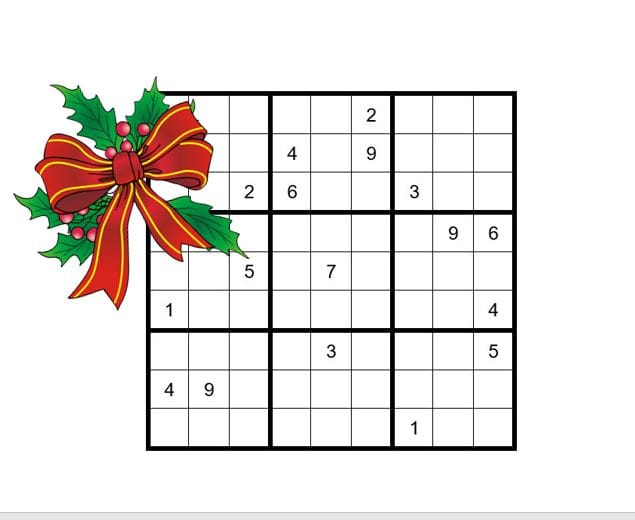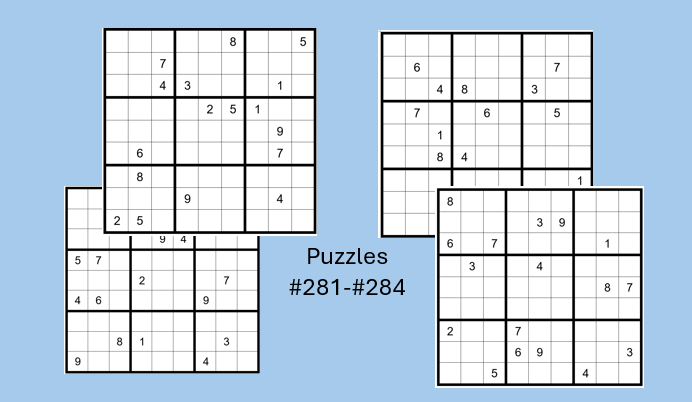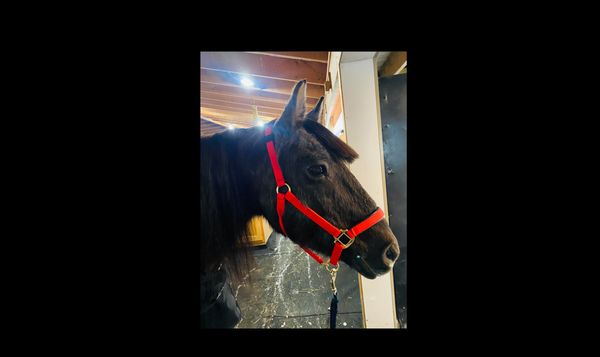Sudoku Puzzle #61
by: Dan LeKander
Happy holidays! I hope this puzzle brings you joy.
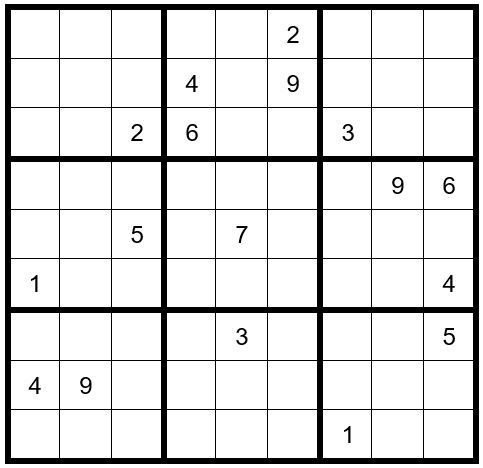
DAN’S 8-STEP APPROACH TO SOLVING ALL SUDOKU PUZZLES
Once you have completed the puzzle, to the extent that you have filled-in all obvious answers and have written all potential options across the top of the unsolved cells (PUZZLE PREPARATION), Dan recommends the following Steps to complete the puzzle.
Step 1: Sudoku Pairs, Triplets and Quads – See September 2015
Step 2: Turbos & Interaction – See October 2015
Step 3: Sudoku Gordonian Rectangles and Polygons – See November 2015
Step 4: XY-Wings & XYZ Wings – See December 2015
Step 5: X-Wings – See January 2016
Step 6: DAN’S YES/NO CHALLENGE
Step 7: DAN’S CLOSE RELATIONSHIP CHALLENGE
Step 8: AN EXPANSION OF STEP 7
Steps 1-5 are relatively common techniques and are explained in the TI LIFE articles above. Steps 6-8 are covered in detail, in Dan’s book.
If we say 7 saves 6, those of you who have been following my articles will probably realize the meaning!
PREPARATION for puzzle #61
Prior to utilizing techniques first complete the 5 Steps of Puzzle Preparation…
- FILL-IN DATA FROM OBSERVATIONS
- FILL-IN OBVIOUS ANSWERS
- FILL-IN NOT-SO-OBVIOUS ANSWERS
- MARK UNSOLVED CELLS WITH OPTIONS THAT CANNOT EXIST IN THOSE CELLS
- FILL-IN THE OPTIONS FOR THE UNSOLVED CELLS
This month we will again complete all of the first 4 steps, in the order we observe them, versus all step 1, then step 2, step 3, and step 4 in order, before we move on to step 5.
We will start with the 1’s and navigate through 2’s to 9’s, then repeat the process until we conclude all step 1-4 clues.
The first thing we observe is that C4R1 (cell in column 4, row 4) =3 (obvious answer). Then, C6R3=7. The options for C4R1, C4R2 & C4R3 are now 158.
We also know that C5R4, C5R6, C5R8 & C5R9 can only contain options 2469, so fill in the options for those cells.
In box 7 (bottom left grid of 9 x 9 cells) a 5 can only exist as an option in C1R9 or C2R9; therefore, a 5 cannot exist in C4R9 or C6R9.
In box 6, a 1 can only exist as an option in C8R5 or C9R5; therefore, a 1 cannot exist in C4R5 or C6R5.
Now your grid should look like Example #60.1 below:
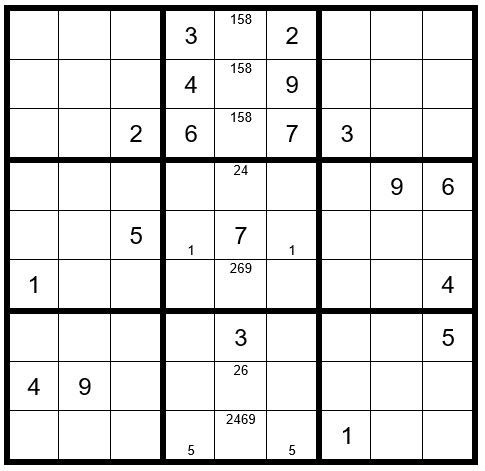
We have now completed Puzzle Preparation steps 1-4, so we will fill-in the options for the unsolved cells. Now your grid should look like Example #60.2 below:
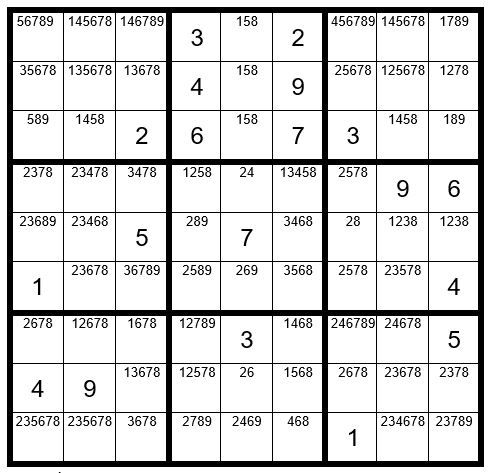
Can you locate any pairs, triplets, quads or quints?
In column 7 we see that the two options 49 only exist in the two cells C7R1 & C7R7, which is a hidden pair (you may have spotted a quint, in that the five options 25678 exist exclusively in five cells, meaning those options may not exist in any other unsolved cells in column 7. Either way, the result is the same.)
Now your grid should look like Example #60.3 below:
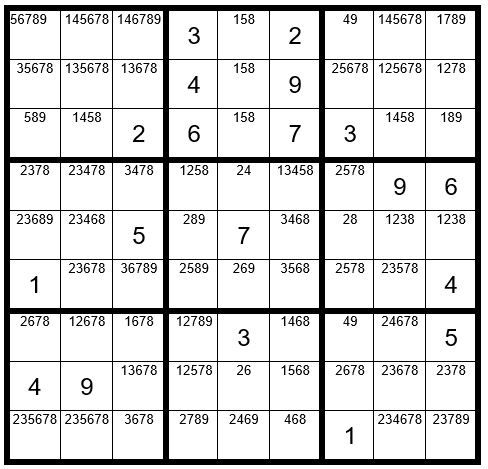
There are no additional Step 1-5 clues, so we will now proceed to Step 6: Dan’s Yes-No Challenge.
There are three circumstances that establish the potential for a Step 6 exercise:
- Look for just 2 unsolved cells in a box that contain the same option, where these 2 cells are not in the same row or column.
- Look for just 2 unsolved cells in a column that contain the same option, where these 2 cells are not in the same box.
- Look for just 2 unsolved cells in a row that contain the same option, where these 2 cells are not in the same box.
We will start by searching the 1’s to see if there is a potential Step 6 clue, and then navigate through the 2-9’s.
In column 3 we find just two unsolved cells with option 4. We will call these two cells our “driver cells” which drive the exercise. One of these two cells must be a 4. We will first start with C3R1 and assume it is the 4, to see what effect it has on the other unsolved cells with option 4. Then, we will assume C3R4 is the 4, to see what effect it has on the other unsolved cells. We will annotate C3R1 with a “Y” for yes, and annotate C3R4 with “y” to indicate yes. Please refer to Example #60.4 below:
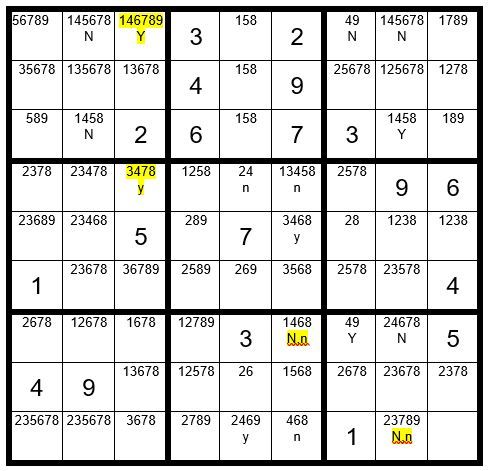
Looking at the example above, if C3R1=4, then C2R1, C2R3, C7R1 & C8R1 are not a 4 (marked as “N”) above. Now in box 3, C8R3 must be a 4 (Y). It follows that C8R7 & C8R9=N, C7R7=Y, C6R7=N. If C3R4=4, then C5R4 & C6R4=n, C6R5=y, C6R7 & C6R9=n, C5R9=y and finally C8R9=n.
Our conclusion is simple, the two cells with the N,n designation are not a 4 regardless of which starter cell is a 4.
Now your grid should look like Example #60.5 below:
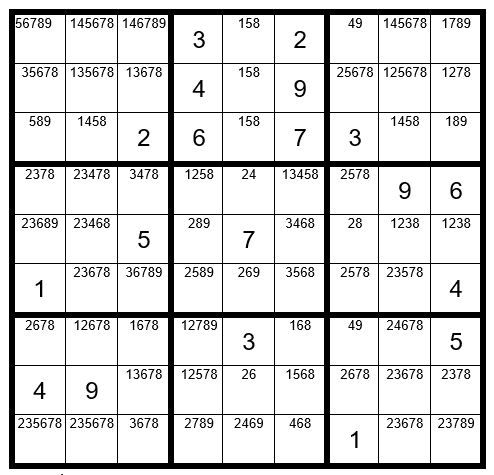
Well, we didn’t solve the puzzle or produce any other leads, so we will continue with another Step 6.
In column 3, we find just two unsolved cells with option 9. We will call these two cells our “driver cells” which drive the exercise. One of these two cells must be a 9. See Example #60.6 below.
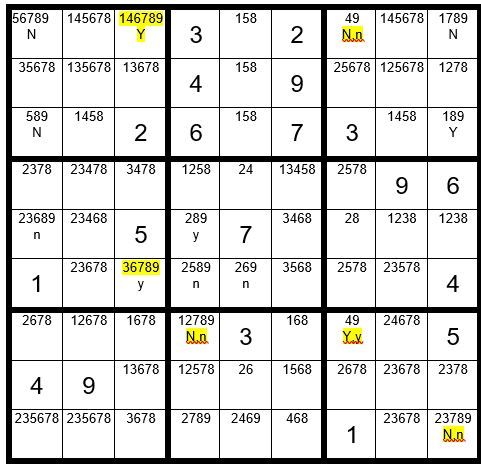
We will first start with C3R1 and assume it is the 9. Then, we will assume C3R6 is the 9, to see what effect it has on the other unsolved cells. We will annotate C3R1 with a “Y” for yes, and annotate C3R6 with “y” to indicate yes. Please refer to Example #60.6 above.
Follow the yes’s and no’s and you see the result above. We have 3 cells with a N,n designation, indicating they cannot be a 9 regardless of which starting cell is the 9. The cell with the Y,y designation is a 9 regardless of which starting cell is a 9. Now we know that C7R7 is a 9 and C7R1=4. It follows that C2R3=4, C3R4=4, C5R4=2, C5R8=6, C5R6=9 and C5R9=4.
The puzzle is now easily solved giving us the answer, Example #60.7 below:
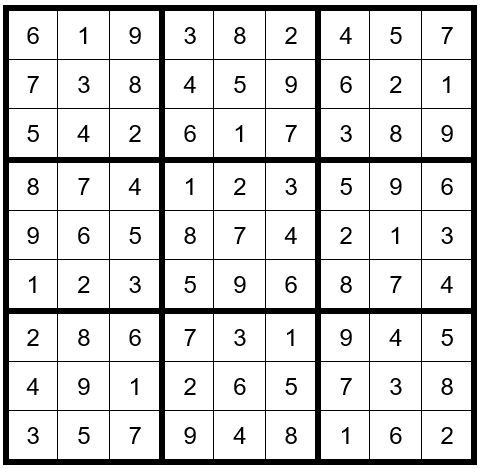
May the gentle winds of Sudoku be at your back.
By Dan LeKander
Editor's Note: It was back in January 2016, when we published a final article in Dan's series of steps to learn the logic of Sudoku – when he asked if we would like a puzzle to solve every month … this editor said an enthusiastic… Yes, please! Now we are several years later and on Puzzle #61. (How many have you solved... please let us know!)
If you have not already done so, I suggest you purchase Dan’s book: “3 Advanced Sudoku Techniques, That Will Change Your Game Forever!” Purchase of a book includes a 50-page blank grid pad, 33 black and two green tokens, to assist with Step 6.…
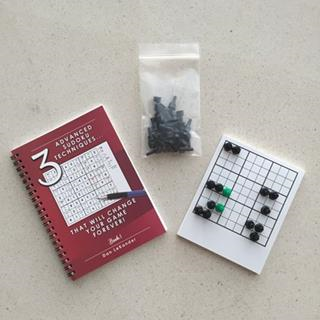
The book is available online at ebay.com.
Most importantly, I ask that you leave comments on any part of his series and throughout the year.
And now we are in December 2019...the end of the year and many puzzles later... I want to thank Dan…and his proofreader… Peggy! I am hoping you will enjoy our monthly Sudoku and at the same time join me in saluting Dan - Bravo to you both…(As I said a few months ago - sometimes I am not so polite when I can't solve the puzzle...)
Be sure to read the review of Dan's book by Jesse Kahn published in Jun 2015.
Also all past Sudoku Puzzle Challenge beginning: February 2016, March 2016, April 2016, May 2016, June 2016, July 2016, August 2016, September 2016, October 2016, November 2016, December 2016, January 2017, February 2017, March 2017 , April 2017, May 2017, June 2017, July 2017, August 2017, September 2017, October 2017, November 2017, December 2017, January 2018, February 2018, March 2018, April 2018. May 2018, June 2018, July 2018, August 2018, September 2018 , October 2018, November 2018, December 2018, January 2019, February 2019, March 2019, April 2019, May 2019 June 2019, July 2019, August, 2019, September 2019, October 2019 and November 2019.

